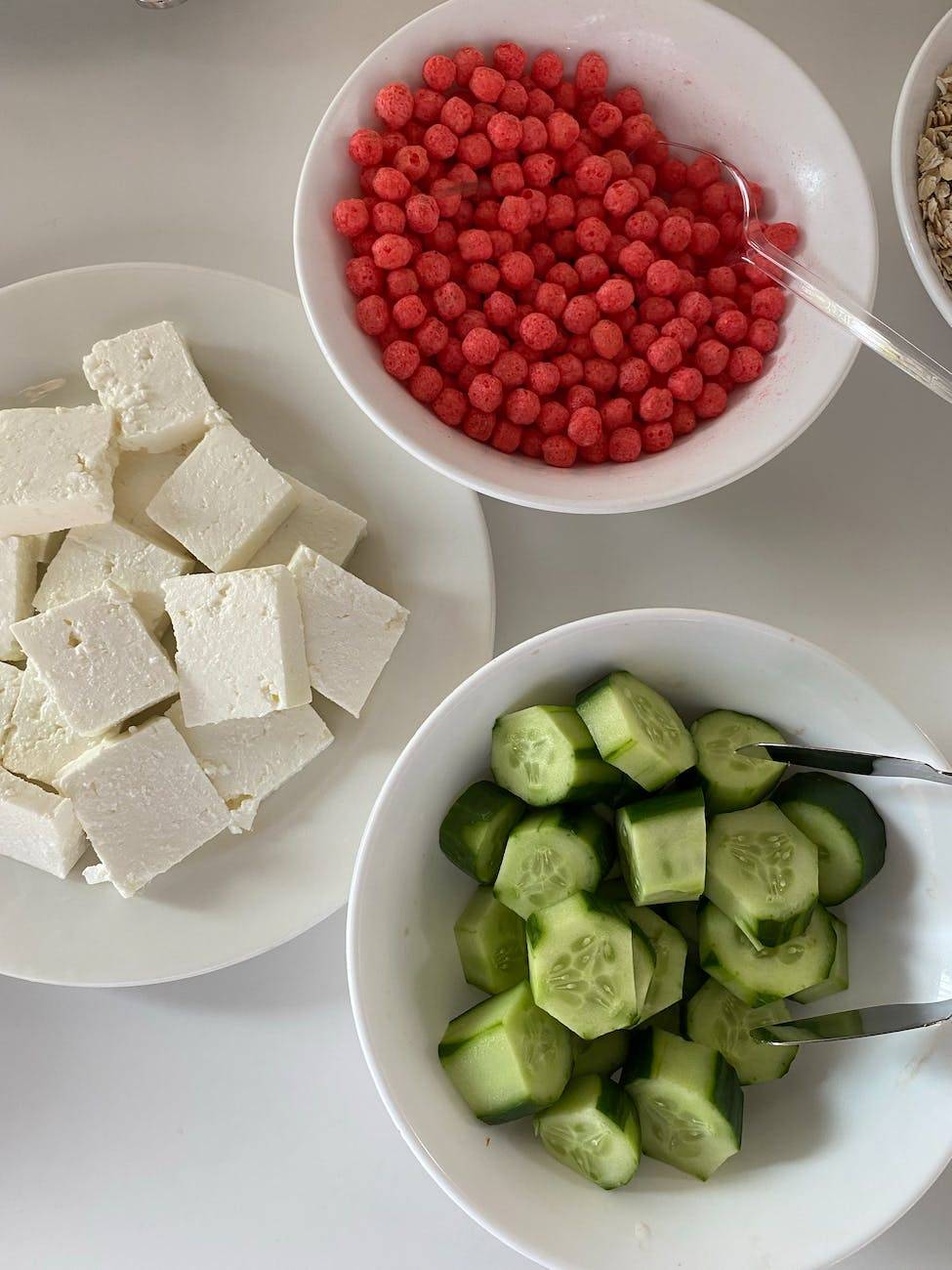Understanding Bulgarian Cheese
Bulgaria, a country known for its rich culinary heritage, offers several unique and flavorful cheeses that are deeply integrated into its food culture. Two of the most popular types of cheese in Bulgarian cuisine are Bulgarian Feta, also known as Sirene, and Bulgarian Kashkaval.
Bulgarian Feta (Sirene) Cheese
Bulgarian feta, or Sirene, is a salty firm cheese with a grainy structure. While it is usually made from cow’s milk, variations made from sheep, goat, and buffalo milk are also common. The flavor and texture of Bulgarian feta can vary depending on the type of milk used, enhancing its versatility in cooking. Unlike the creamy Greek feta cheese, Bulgarian feta usually crumbles (The Culture Trip).
This cheese is an integral part of Bulgarian cuisine and is used in various traditional dishes. It’s added to pastries, vegetable stews, and salads, including the national dish – the Shopska salad. Sirene Po Shopski, a popular dish that consists mainly of Bulgarian feta cheese stewed in a clay pot with eggs, tomatoes, and butter, is another example that highlights the importance of this cheese in Bulgarian dishes (The Culture Trip).
For more information on Bulgarian Feta and where to buy it, visit the where to buy Bulgarian feta page.
Bulgarian Kashkaval Cheese
Kashkaval is another popular type of cheese in Bulgaria. It is a yellow, medium-hard cheese, similar in texture and appearance to Dutch Gouda cheese or Swiss Emmental. The cheese is known to melt when baked and is usually added towards the end of the cooking process to lend a creamy and rich texture to dishes (The Culture Trip).
Bulgarian Kashkaval cheese is versatile and pairs well with a variety of foods. Whether it’s melted over a traditional Bulgarian dish or sliced and served with bread and olives, its distinctive flavor adds a delightful touch to any meal.
By understanding the unique characteristics and uses of these Bulgarian cheeses, one can appreciate the depth and diversity of Bulgarian cuisine. Visit our Bulgarian cheese page for more insights into the world of Bulgarian dairy.
Characteristics of Bulgarian Cheese
To appreciate the distinctive qualities of Bulgarian cheese, it’s important to examine the ingredients used to create it, the preparation process, and the resulting flavor and texture.
Ingredients and Preparation
Bulgarian feta cheese, also known as Sirene, is traditionally made from sheep’s milk or a combination of sheep’s and goat’s milk. This is a significant difference compared to other variations of feta cheese, which can be made from cow’s milk. The type of milk used greatly influences the final taste and texture of the cheese, with cow milk producing a mellow and creamy feta, while sheep and goat milk create a more acidic flavor (Cooking Stack Exchange).
The traditional method of making Bulgarian feta cheese involves a special process where wooden barrels are used for the brining process. This not only adds a unique flavor to the cheese but also contributes to its distinctive texture. For more detailed information about the making of Bulgarian cheese, you can visit our page on Bulgarian cheese.
Flavor and Texture
Bulgarian feta cheese is renowned for its tangy and salty flavor, with a crumbly texture (Cheesemaking.com). Its flavor profile is often described as more assertive than many Greek fetas, highlighting its strong and distinct character.
The texture of Bulgarian feta cheese is also unique. It’s typically grainier and denser than other types of feta (Cooking Stack Exchange). This distinct texture makes it an excellent choice for various culinary applications, from salads to baking.
In conclusion, the unique properties of Bulgarian cheese, particularly Bulgarian feta, are a result of its specific ingredients, preparation process, and the resulting flavor and texture. These characteristics set it apart and make it a sought-after choice for cheese lovers and culinary enthusiasts alike. To learn more about where to buy authentic Bulgarian feta cheese, check out our article on where to buy Bulgarian feta.
Bulgarian Cheese in Traditional Cuisine
Bulgarian cheese, especially Bulgarian feta, plays a significant role in the culinary landscape of Bulgaria. It is not only a staple in the daily diet but also an essential component of many traditional Bulgarian dishes.
Role in Bulgarian Dishes
Bulgarian feta, also known as sirene, is a salty firm cheese with a grainy structure. It is usually made from cow’s milk but can also be produced from sheep, goat, and buffalo milk. The Bulgarian feta crumbles, unlike the creamy Greek feta cheese (The Culture Trip).
One of the most popular uses of Bulgarian feta is in the national Shopska salad. This refreshing dish typically consists of diced tomatoes, cucumbers, onions, peppers, and a hearty topping of crumbled Bulgarian feta.
Another traditional preparation is Sirene Po Shopski, a dish that consists mainly of Bulgarian feta cheese stewed in a clay pot with eggs, tomatoes, and butter. This hearty and flavorful dish can be found in almost every restaurant in the country.
Pairings with Other Foods
In addition to its role in traditional dishes, Bulgarian cheese is a versatile ingredient that pairs well with a variety of foods. Bulgarians enjoy cheese with almost every meal, including on slices of bread, in pastries, with scrambled eggs, in salads, and even with sweet desserts.
Given its strong, salty flavor, Bulgarian feta is a perfect counterpoint to sweet fruits like figs and grapes. It also pairs well with robust red wines and crisp white wines, making it a popular choice for cheese platters.
Whether you’re exploring Bulgarian cuisine or simply looking for a new cheese to try, Bulgarian feta offers a unique flavor experience. To savor this authentic cheese at home, visit our guide on where to buy Bulgarian feta.
Where to Buy Bulgarian Cheese
Whether you’re a seasoned cheese enthusiast or a culinary explorer looking to expand your palate, Bulgarian cheese is a must-try delicacy. Known for its high quality and unique taste, Bulgarian cheese, often referred to as ‘sirene’ or ‘kashkaval’, is a popular choice both in Bulgaria and internationally. But, where can you buy this authentic cheese in Bulgarian style?
Buying Locally
Depending on where you live, you may be able to find Bulgarian cheese at local grocery stores, especially those that carry international products. Specialty cheese shops and farmers markets are also good places to look. Be sure to ask for ‘sirene’ if you’re looking for Bulgarian feta, or ‘kashkaval’ for a different type of Bulgarian cheese.
If you’re lucky enough to live in a city with a Bulgarian community, check out any local Bulgarian or Eastern European markets. These are often the best places to find authentic Bulgarian cheese, and you’ll likely have the option to choose from a variety of types, including Bulgarian sheep cheese, Bulgarian white cheese, or Bulgarian white brined cheese.
Online Shopping Options
If local options aren’t available, there’s no need to fret. Thanks to the internet, you can easily order Bulgarian cheese online. Various online cheese shops and specialty food retailers offer Bulgarian cheese, and many of them ship nationwide or even internationally.
Before purchasing, consider checking customer reviews to ensure the quality of the cheese and the reliability of the seller. Also, consider the shipping and handling process – cheese is a perishable item, and it’s important that it’s shipped in a way that maintains its quality.
Now that you know where to buy Bulgarian cheese, you can enjoy its unique taste in your own home. Whether you savor it on its own, pair it with local alcoholic beverages such as rakia or red wine (Food Fun Travel), or incorporate it into traditional Bulgarian dishes, Bulgarian cheese is sure to bring a touch of the Balkans to your table.
Looking for more specific options? Check out our page on where to buy Bulgarian feta, or search for ‘Bulgarian feta cheese near me’ to find local retailers offering this delectable cheese.
Preserving and Savoring Bulgarian Cheese
Once you’ve purchased your Bulgarian feta cheese, it’s important to know how to store it properly to maintain its quality, and how to savor it to enjoy the unique flavors that make this cheese a popular choice among culinary enthusiasts.
Storage and Shelf Life
Bulgarian cheese should be stored in a cool, dark place, ideally in the refrigerator. It should be kept in its original packaging until it is ready to be used. Once opened, it should be stored in an airtight container to prevent it from drying out. Depending on the type of Bulgarian cheese, the shelf life may vary. Bulgarian feta, or sirene, can typically be stored for several weeks in the refrigerator if kept in a brine solution to maintain its freshness.
Serving Suggestions
The unique flavor of Bulgarian cheese makes it a versatile ingredient that can be used in a variety of dishes. It is often enjoyed with local alcoholic beverages such as rakia or red wine, enhancing the flavors of both the cheese and the drink.
Bulgarian feta, or sirene, is a salty firm cheese with a grainy structure. It can be used in traditional pastries, vegetable stews, and salads. Its crumbly texture contrasts with the creamy Greek feta cheese, offering a unique taste experience.
Bulgarians eat cheese with almost every meal, including on slices of bread, in pastries, with scrambled eggs, in salads, and even with sweet desserts (The Culture Trip).
Experimenting with different serving suggestions can reveal new ways to enjoy this versatile cheese. For a traditional Bulgarian experience, try using Bulgarian feta in a Shopska salad, or enjoy it with a slice of fresh bread and a glass of rakia.
Whether you’re a culinary enthusiast or simply a cheese lover, exploring the world of Bulgarian cheese offers a unique journey into the rich culinary traditions of Bulgaria. So, enjoy the process of discovering, preserving, and savoring this treasured element of Bulgarian cuisine.




Leave a Reply